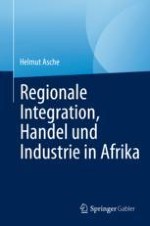2023 | OriginalPaper | Buchkapitel
8. Grundzüge Gemeinsamer Industriepolitik
verfasst von : Helmut Asche
Erschienen in: Regionale Integration, Handel und Industrie in Afrika
Aktivieren Sie unsere intelligente Suche, um passende Fachinhalte oder Patente zu finden.
Wählen Sie Textabschnitte aus um mit Künstlicher Intelligenz passenden Patente zu finden. powered by
Markieren Sie Textabschnitte, um KI-gestützt weitere passende Inhalte zu finden. powered by
